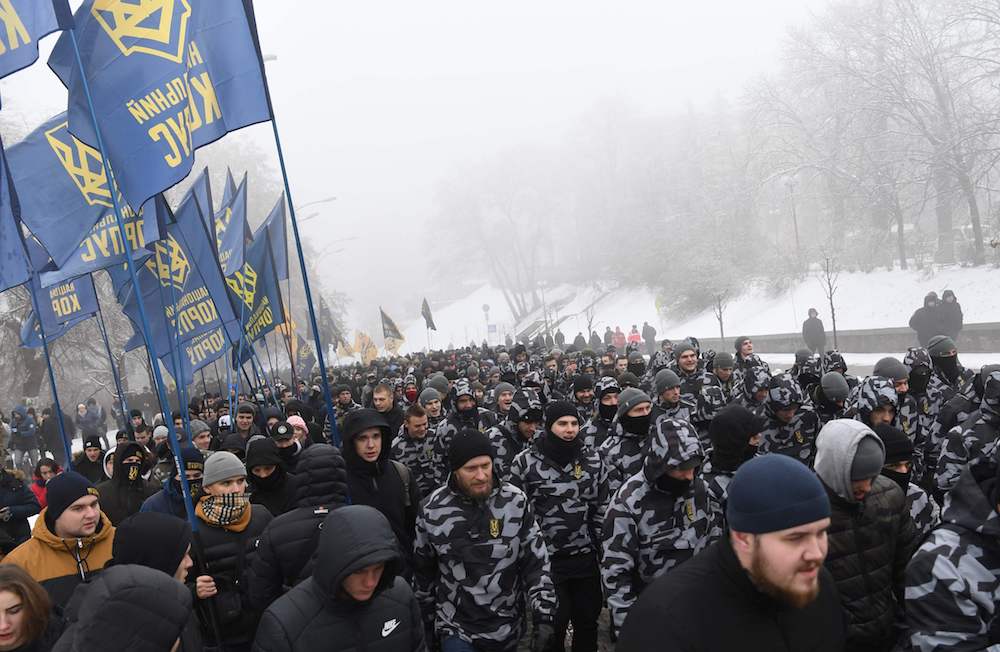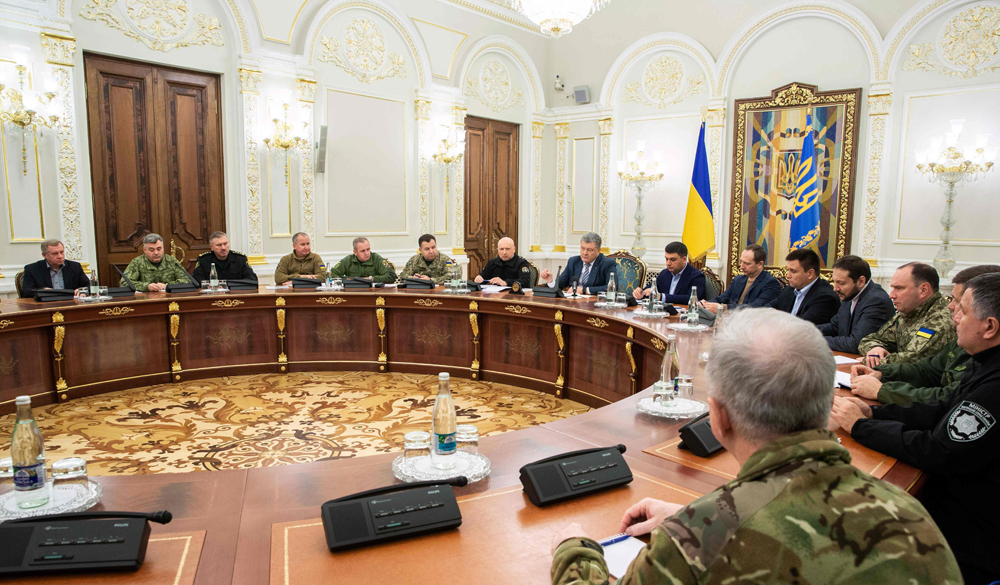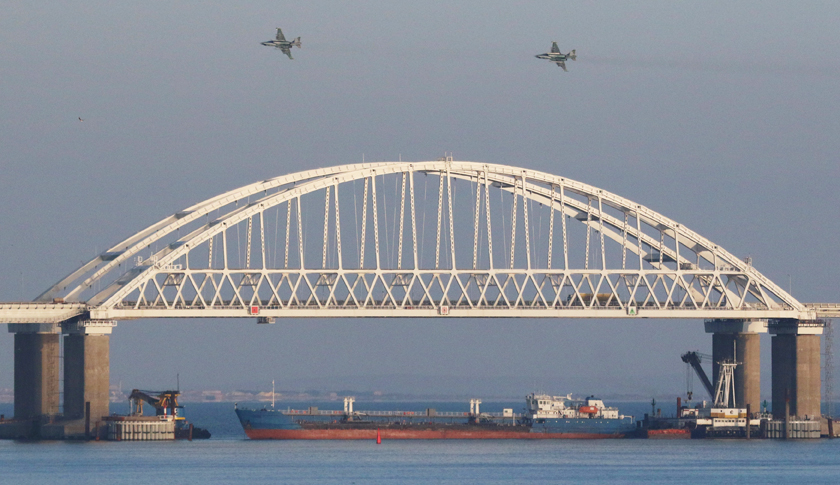WASHINGTON: Ukrainian President Petro Poroshenko signed a decree on Monday to introduce martial law for 60 days, but the country's parliament only approved a 30-day period to come into force.
The decision came a day after Russia fired at and captured three Ukrainian vessels, triggering a sharp escalation in tensions between the two countries.
Ukrainian legislation on martial law allows for a slew of curbs, including restrictions on movement and peaceful assembly, curfews, and restricting the media, though Poroshenko's decree made no specific references to such restrictions.
Eleven measures outlined in the decree provide for mobilizing reserve forces, organizing the air defence of important state facilities and taking urgent steps to bring in enhanced cyber security measures and ensure public order.
There was no mention of a presidential election due to be held in March. Poroshenko's move has prompted speculation by critics and opposition politicians that he might use it to delay the vote.
A twelfth provision of the decree was not published.

Activists of Ukrainian far-right groups march to the parliament in Kiev on November 26, 2018, as they demand to set martial law in the country and to cut diplomatic relations with Russia. (AFP)
The UN Security Council will also hold an emergency meeting after the stand-off, US ambassador to the UN Nikki Haley said.
"An emergency Security Council meeting has been called for tomorrow at 11 am," she tweeted.
The meeting was requested by both Russia and Ukraine, diplomatic sources told AFP.
“In order to stop the Ukrainian military ships, weapons were used,” Russia’s FSB security service said, confirming that “three Ukrainian navy ships were boarded and searched.”
Ukraine’s navy said the incident took place as two small warships and a tugboat were heading through the strait for the port of Mariupol.
It said a Russian border guard vessel rammed the tugboat in “openly aggressive actions” and then fired on the ships, immobilizing all three.
It also said the Kerch Strait was blocked by a tanker, and that Russian military aircraft were flying over the area.
Ukraine said six of its soldiers were injured, while the FSB reported only three had suffered non-life threatening injuries and were given medical treatment.
“Having breached this morning the Russian border, the three Ukrainian ships — the Berdyansk, the Nikopol and the Yani Kapu — tried again on November 25 at 19:00 (Moscow time) to conduct illegal actions in Russian territorial waters,” the FSB said.
The FSB, which oversees the border guard service, also said the Ukrainian ships had failed to respond to the “legal demands” of the Russian authorities and that they were aiming “to create a conflict situation in this region.”
The European Union issued a statement saying: “We expect Russia to restore freedom of passage at the Kerch strait and urge all to act with utmost restraint to de-escalate the situation immediately.”
NATO in a statement also urged “restraint and de-escalation,” and called on Russia “to ensure unhindered access to Ukrainian ports in the Azov Sea, in accordance with international law.”

Ukraine's President Petro Poroshenko (C) leading a session of the National Security and Defense Council of Ukraine in Kiev early on November 26, 2018, following an incident in the Black Sea off Moscow-annexed Crimea. (AFP)
The confrontation at sea is a dangerous development in the long-running conflict pitting Ukraine against Russia and Russian-backed rebels in the east of the country.
Ukrainian President Petro Poroshenko said “Russian special forces have taken over some ships.” He called a meeting of his military cabinet to evaluate and determine his country’s next steps.
Ukraine’s foreign ministry said it considered “these aggressive actions” a violation of international law that would be met with “an international and diplomatic legal response,” and its envoy to the United Nations said on Twitter that the country will make an immediate appeal to the Security Council.
Russia for its part accused Kiev of illegally entering its waters and deliberately provoking a conflict. Moscow claims the waters off Crimea after annexing the peninsula in 2014.
Russian politicians accused Ukraine of acting at the behest of its Western allies and deliberately attempting to escalate the conflict.
Crimean leader Sergei Aksyonov wrote on Facebook that he “was sure the Western masters of the Kiev regime are behind this act of provocation.”
Pyotr Tolstoy, deputy speaker of the Russian parliament, warned on Facebook that “the Ukrainian puppet authorities... are risking unleashing a large military conflict.”
“One thing is clear: Russia won’t allow military provocations in its territorial waters,” he said.

Russian jet fighters fly over a bridge connecting the Russian mainland with the Crimean Peninsula with a cargo ship beneath it on Nov. 25. (Reuters)
Ukraine said it gave Russia advance warning of its ships’ route, which its vessels are obliged to take to reach the Sea of Azov.
The latest incident comes after the Ukrainian navy in September complained of “acts of provocation” by Russian border guards against its ships taking the same route.
Ukraine has increased the number of its navy ships and border guard patrols in the Sea of Azov after Russia deployed five more warships there.
Kiev says its naval buildup is due to Russia stepping up controls in the area this year and carrying out lengthy checks on commercial shipping that were very costly for freight and port companies.
Kiev and the West have accused Moscow of deliberately blocking ships from accessing Mariupol, which has vital access to heavy industry in the region.
Mariupol is close to the region of eastern Ukraine controlled by Russian-backed separatists in a conflict that has caused at least 10,000 deaths since 2014.
The United States, a key ally to Ukraine, is opposed to Russia’s takeover of Crimea and is looking to reduce Ukraine’s dependency on Russian gas pipelines.
















